by Scott Keeter, Director of Survey Research, Pew Research Center, and Juliana Horowitz, Research Associate, Pew Research Center for the People & the Press
February 12 will mark the 200th anniversary of the birth of Charles Darwin, the British naturalist who developed the theory of evolution through natural selection. Darwin published his treatise on evolution, On the Origin of Species by Means of Natural Selection, nearly 150 years ago. Darwin’s theory was controversial from the outset, and remains so among the public in his home country as well as in the U.S. and elsewhere.
Opinion polls over the past two decades have found the American public deeply divided in its beliefs about the origins and development of life on earth. Surveys are fairly consistent in their estimates of how many Americans believe in evolution or creationism. Approximately 40%-50% of the public accepts a biblical creationist account of the origins of life, while comparable or slightly larger numbers accept the idea that humans evolved over time. The wording of survey questions generally makes little systematic difference in this division of opinion, and there has been little change in the percentage of the public who reject the idea of evolution.
Opinions on the theory of “intelligent design,” however, are far more complex, making it difficult to determine how many Americans subscribe to this view of life’s origins. In part, this reflects the public’s lack of familiarity with the concept of intelligent design, which holds that Darwin’s theory of natural selection is inadequate in explaining the development of complex life forms. A Gallup survey in August of 2005 found that fewer than half of Americans were familiar with the term. Moreover, because the concept involves sensitive matters of faith and science, questions that attempt to indirectly measure support for intelligent design produce divergent results.
Consider for example the approaches taken by the Pew Research Center for the People & the Press and Gallup (see table below). The two organizations find similar numbers in favor of a creationist position — 42% for Pew Research, 44% for Gallup — although each describes the concept in decidedly different terms. But Pew Research finds far more people believing in natural selection (26% vs. 14% for Gallup) while Gallup finds more subscribing to the view that God or a supreme being guided the evolutionary process (36% vs. 21% for Pew Research).
[the evolutionary]
Pew Research, on the other hand, asks people initially if they believe life “evolved over time” or existed in its “present form since the beginning of time”; the question makes no mention of God. Those who said that life evolved over time were then asked if life “evolved due to natural processes such as natural selection” or whether “a supreme being guided the evolution of living things for the purpose of creating humans and other life in the form it exists today.” Pew Research’s formulation provides a significantly more positive description of the scientific position by characterizing natural selection as “a natural process” rather than something “God had no part in.” This implicitly allows people who believe that God or a supreme being set the evolutionary process in motion, or even shaped it in some way, to still opt for “natural selection” as the main engine of evolution.
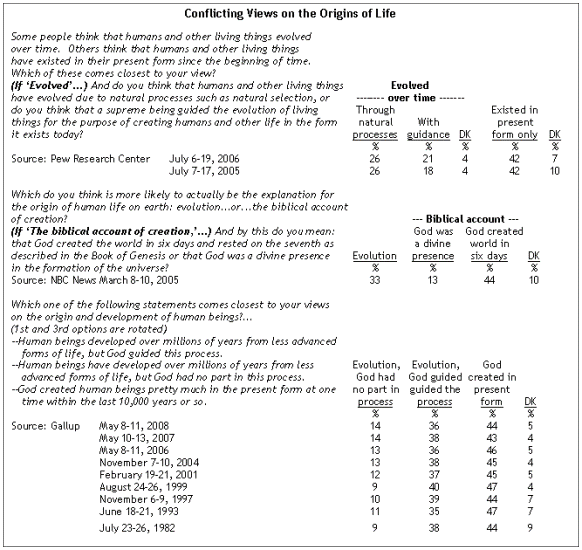
Confusing Concepts
Most Americans say they are familiar with creationism and evolution, but recent polling suggests that there is some confusion about the meaning of these terms. In an August 2005 Gallup poll, 58% of the public said that creationism was definitely or probably true as an explanation for the origin and development of life, but about the same number also said the same about evolution. Since creationism and evolution are incompatible as explanations, some portion of the public is clearly confused about the meaning of the terms.
A 1999 Fox News poll of registered voters offered respondents the explicit option to say that both Darwin’s theory of evolution and the biblical account of creation were true: 26% said both were. More recently, a July 2005 Pew Research Center poll found that a substantial 35% minority of those who accept creationist accounts of life’s origins nonetheless oppose removing the teaching of evolution in public schools in favor of teaching creationism; 14% of those who accepted natural selection favored teaching creationism instead of evolution.
The term “intelligent design” is still unknown to much of the public. In the August 2005 Gallup survey, 52% said they were either “not too familiar” or “not at all familiar” with the phrase. By comparison, far fewer were not familiar with “evolution” and “creationism.” Given the low level of public awareness of the term, “intelligent design” is rarely mentioned in polling on the origins of life.
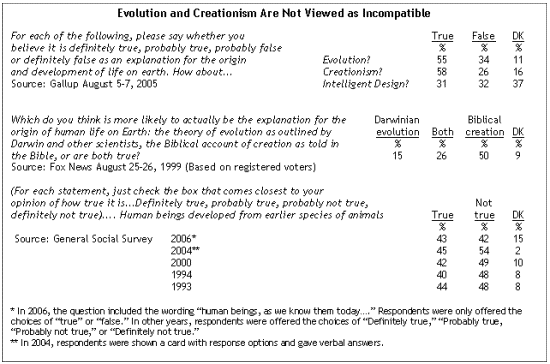
Scientists and Evolution
A majority of the public (62% in a July 2006 Pew Research poll) believes that scientists are generally in agreement about evolution. But fewer believe there is strong scientific evidence in support of evolution. A March 2007 Newsweek survey found just 48% saying evolution was both widely accepted in the scientific community and well supported by evidence. A 2004 Gallup poll registered fewer (35%) saying Darwin’s theory of evolution has been “well-supported by evidence.” This question also offered respondents the choice of saying they don’t know enough about the issue, an option that 30% selected.
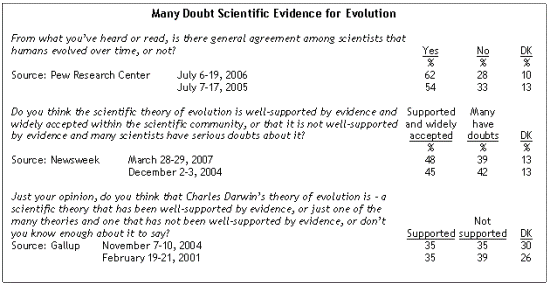
Teach Evolution, Other Approaches
In recent years, decisions by school boards to teach alternative accounts of the origins of life have generated much controversy. In 2005, a federal district court struck down a Dover, Pa. school board requirement that teachers include the teaching of “intelligent design” in science classes. However, polling finds that a solid majority of Americans over the past 20 years has supported the teaching of both evolution and creationist accounts of the origins of life. A June 1999 Gallup/CNN/USA Today poll found that 68% of the public favored teaching creationism along with evolution in public schools. A more recent Pew Research poll conducted in July 2006 found that a 58% majority held that view. There is far less support for removing evolution from the curriculum. In July 2005, a Pew Research poll found that a substantial 38% minority favored teaching creationism instead of evolution.
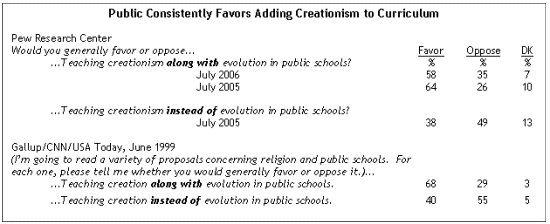
Relatively few questions have asked if respondents believe that evolution should be taught, perhaps because it is the status quo today. A Gallup poll found 61% favoring the teaching of evolution in public school science classes, while 54% said creationism should be taught and 43% said that intelligent design should be taught.
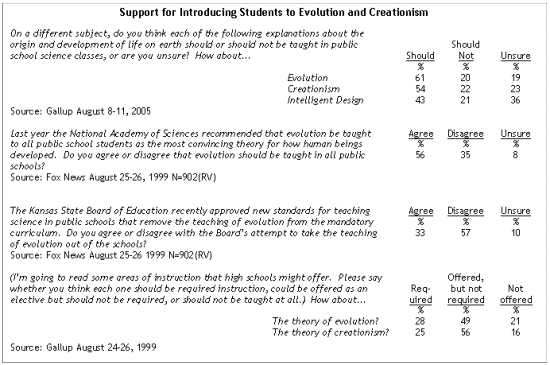
A survey conducted by Fox News in 1999 found nearly identical majorities of people favoring the teaching of evolution and opposing its removal from the curriculum. In one version of the question, respondents were told that the Kansas State Board of Education adopted new standards that would remove evolution from the mandatory curriculum; a 57% majority of registered voters disagreed with the board’s actions, while 33% agreed with the removal. The other version stated that “the National Academy of Sciences recommended that evolution be taught to all public school students as the most convincing theory for how human beings developed” and then asked if respondents agreed or disagreed that evolution should be taught in all public schools: 56% agreed with teaching evolution and 35% disagreed with it. Thus, despite the invocation of two very different kinds of authority on opposite sides of the issue, the public opinion result was the same.
None of the polls probes deeply into what respondents are thinking when they say a particular approach should be taught. Should standardized science tests now include sections on both evolution and creationism? Does support for teaching evolution (or creationism) mean mandatory or optional instruction? Unfortunately there is little public opinion research to shed light on these questions.
Revised and updated from a Pollwatch published September 28, 2005. For an analysis of the relationship between religious beliefs and opinions about evolution, see “Many Americans Uneasy with Mix of Religion and Politics” (Aug. 24, 2006) and “Religion A Strength And Weakness For Both Parties” (Aug. 30, 2005).